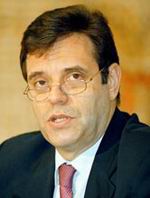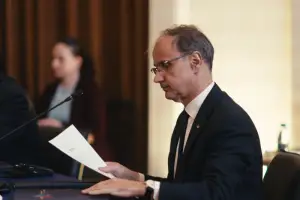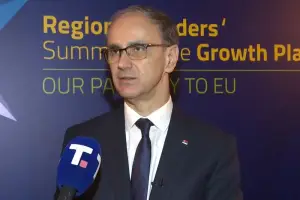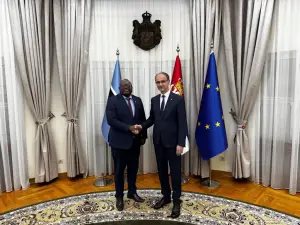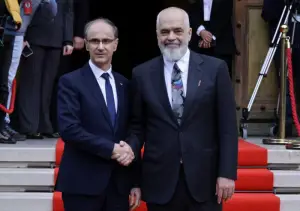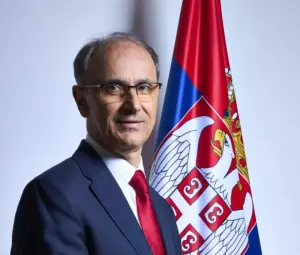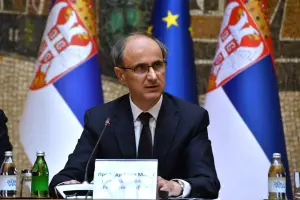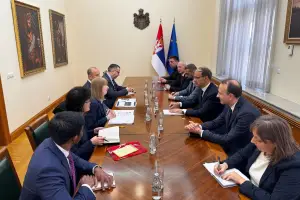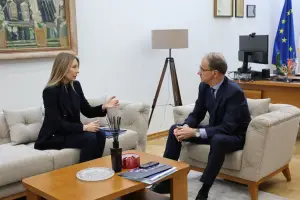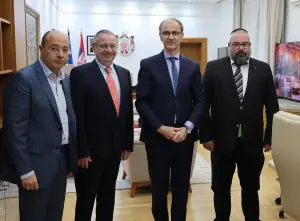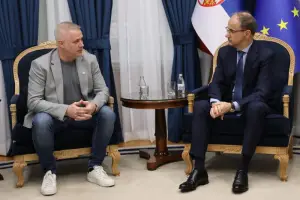Q:
A:
Economic modernisation and Serbian integration in EU top government goals
Belgrade/Berlin,
17 November 2004
Addressing the fourth economic conference of South Eastern Europe in Berlin, Serbian Prime Minister Vojislav Kostunica said that the most important objective of the Serbian government is to modernise economy, improve living standards of citizens and integrate Serbia in the European Union (EU).
“Your Excellencies, Ladies and Gentlemen,
It gives me great pleasure to address the members of German business and political community as well as the other guests coming from South Eastern Europe. I value this opportunity to present the progress Serbia made and especially to hear your suggestions what further needs to be improved.
I wish to emphasise that Germany is our most important industrial and trade partner. There are more than 140 German companies presently operating in Serbia. The financial support extended to Serbia from Germany is extremely important for the success of our transition. These facts illustrate the importance of our economic cooperation, leaving a strong imprint on the development of overall relations between our two nations.
Yet, I believe that we can export more to Germany. I do also strongly believe that Serbia can attract much more investment, including German. German companies can participate in the ongoing privatisation in Serbia, the pace of which is accelerating. The success of Henkel is an excellent example. Also, fresh, “Greenfield” investments can be made into various industries.
In spite of the fact of that German businessmen have a traditional presence in our region, I think that you need and deserve more information about us, and conferences like this pose a good opportunity to this end.
I do believe that our bilateral Business Council, having its next session beginning in December, shall also reinforce our commercial relations strongly. Now when we have the Standard & Poor's credit rating, HERMES could reconsider its credit and insurance policy toward Serbia.
Let me turn your attention to an issue that offers vast business opportunities. I am sure that you are aware of the emerging Free Trade Area in South-East Europe. Your countryman Bodo Hombach was one of the architects of this important result of the Stability Pact for Southeastern Europe. All the free trade agreements have been signed and ratified, and this enormous market of over 50 million is starting to appear before our eyes. Please note that Serbia and Montenegro has a free trade agreement with the Russian Federation as well. Having a location on two important European corridors makes Serbia a reasonable choice for regional centres for various industries. Those that might be reluctant to invest in a market of a few million will seriously reconsider their options when faced with a market of 50 million people.
Political relations in the region are improving by the day. Without political progress, a Free Trade Area would hardly be conceivable. The era of confrontation is making way to an era of cooperation and friendship. Just a few days ago I had substantive and productive talks with the Prime Minister of Croatia. The Free Trade Area shall improve our national economies, but also prepare the entire region for integration into the EU.
When it comes to the economic policy of my Government, I wish to underline and assure you in person that our most important objective is to create a business environment which is familiar and reliable to you - liberal, politically stable and commercially safe.
The challenges we are facing are huge. Yet, the transition process has started and is well under way, and we are firmly committed to its continuation and acceleration. We are passing new laws aimed at fundamental modernisation of the legal system and simultaneously consolidating institutions capable of enforcing them. We have attractive tax, customs and other incentives to invest in Serbia. I want to convey to you this message: the overriding objective of the Serbian Government and Serbian society is to modernise the economy, increase the standard of living and to integrate Serbia into the EU. The generation of politicians coming from South Eastern Europe shall be judged in history by our successes or failures in bringing our societies closer together, closer to democracy, to modernity and humanism. In other words - closer to the EU.”
Immediately upon arrival in Berlin, Kostunica met with spokesman and deputy of the opposition Christian Democratic Union in the German parliament, Friedbert Pfluger, who is also vice-president of the parliament's group for cooperation with Serbia-Montenegro.
Kostunica also met with German Minister for Economic Cooperation and Development Heidemarie Wieczorek-Zeul and presented the economic problems of Serbia in its transition period, stressing the importance of German support.
Also participating in talks was Serbian Minister of International Economic Relations Milan Parivodic, who told Tanjug that a German-Serbia-Montenegrin business council is expected to meet on December 2 in Berlin, which will considerably improve the two countries’ economic relations.
Apart from the Serbian Prime Minister, the Berlin conference, which was called by German Chancellor Gerhard Schroeder, gathered prime ministers of Montenegro Milo Djukanovic, Bosnia-Herzegovina Adnan Terzic, Croatia Ivo Sanader and Albania Fatos Nano, as well as presidents of Armenia and Kyrgyzstan, Robert Kocharian and Askar Akayev respectively.
The German Chancellor will hold separate meetings with leaders of all seven states, with Kostunica’s meeting scheduled for Thursday.
Apart from political talks at the ministerial level, the conference is very significant for Serbia-Montenegro because it is expected that a level of cooperation with the German Chamber of Commerce be agreed upon.
It gives me great pleasure to address the members of German business and political community as well as the other guests coming from South Eastern Europe. I value this opportunity to present the progress Serbia made and especially to hear your suggestions what further needs to be improved.
I wish to emphasise that Germany is our most important industrial and trade partner. There are more than 140 German companies presently operating in Serbia. The financial support extended to Serbia from Germany is extremely important for the success of our transition. These facts illustrate the importance of our economic cooperation, leaving a strong imprint on the development of overall relations between our two nations.
Yet, I believe that we can export more to Germany. I do also strongly believe that Serbia can attract much more investment, including German. German companies can participate in the ongoing privatisation in Serbia, the pace of which is accelerating. The success of Henkel is an excellent example. Also, fresh, “Greenfield” investments can be made into various industries.
In spite of the fact of that German businessmen have a traditional presence in our region, I think that you need and deserve more information about us, and conferences like this pose a good opportunity to this end.
I do believe that our bilateral Business Council, having its next session beginning in December, shall also reinforce our commercial relations strongly. Now when we have the Standard & Poor's credit rating, HERMES could reconsider its credit and insurance policy toward Serbia.
Let me turn your attention to an issue that offers vast business opportunities. I am sure that you are aware of the emerging Free Trade Area in South-East Europe. Your countryman Bodo Hombach was one of the architects of this important result of the Stability Pact for Southeastern Europe. All the free trade agreements have been signed and ratified, and this enormous market of over 50 million is starting to appear before our eyes. Please note that Serbia and Montenegro has a free trade agreement with the Russian Federation as well. Having a location on two important European corridors makes Serbia a reasonable choice for regional centres for various industries. Those that might be reluctant to invest in a market of a few million will seriously reconsider their options when faced with a market of 50 million people.
Political relations in the region are improving by the day. Without political progress, a Free Trade Area would hardly be conceivable. The era of confrontation is making way to an era of cooperation and friendship. Just a few days ago I had substantive and productive talks with the Prime Minister of Croatia. The Free Trade Area shall improve our national economies, but also prepare the entire region for integration into the EU.
When it comes to the economic policy of my Government, I wish to underline and assure you in person that our most important objective is to create a business environment which is familiar and reliable to you - liberal, politically stable and commercially safe.
The challenges we are facing are huge. Yet, the transition process has started and is well under way, and we are firmly committed to its continuation and acceleration. We are passing new laws aimed at fundamental modernisation of the legal system and simultaneously consolidating institutions capable of enforcing them. We have attractive tax, customs and other incentives to invest in Serbia. I want to convey to you this message: the overriding objective of the Serbian Government and Serbian society is to modernise the economy, increase the standard of living and to integrate Serbia into the EU. The generation of politicians coming from South Eastern Europe shall be judged in history by our successes or failures in bringing our societies closer together, closer to democracy, to modernity and humanism. In other words - closer to the EU.”
Immediately upon arrival in Berlin, Kostunica met with spokesman and deputy of the opposition Christian Democratic Union in the German parliament, Friedbert Pfluger, who is also vice-president of the parliament's group for cooperation with Serbia-Montenegro.
Kostunica also met with German Minister for Economic Cooperation and Development Heidemarie Wieczorek-Zeul and presented the economic problems of Serbia in its transition period, stressing the importance of German support.
Also participating in talks was Serbian Minister of International Economic Relations Milan Parivodic, who told Tanjug that a German-Serbia-Montenegrin business council is expected to meet on December 2 in Berlin, which will considerably improve the two countries’ economic relations.
Apart from the Serbian Prime Minister, the Berlin conference, which was called by German Chancellor Gerhard Schroeder, gathered prime ministers of Montenegro Milo Djukanovic, Bosnia-Herzegovina Adnan Terzic, Croatia Ivo Sanader and Albania Fatos Nano, as well as presidents of Armenia and Kyrgyzstan, Robert Kocharian and Askar Akayev respectively.
The German Chancellor will hold separate meetings with leaders of all seven states, with Kostunica’s meeting scheduled for Thursday.
Apart from political talks at the ministerial level, the conference is very significant for Serbia-Montenegro because it is expected that a level of cooperation with the German Chamber of Commerce be agreed upon.

